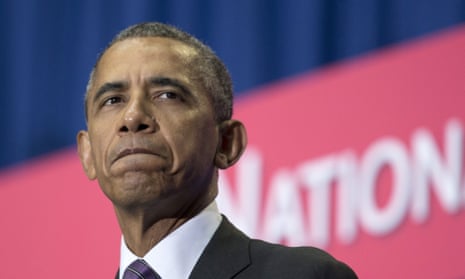The White House began lobbying Democrats to take a fresh look at a controversial free trade agreement on Monday after concessions aimed at appeasing some critics on the left risked fracturing fragile support among Republicans.
Despite narrowly securing congressional approval to negotiate the Trans-Pacific Partnership (TPP) agreement with 11 other countries, Barack Obama still has to persuade a majority of US lawmakers to pass the final deal, which aims to remove thousands of import tariffs.
The White House warned it would take several months before a vote on TPP but said officials had already begun to contact members of Congress to persuade them the deal walked a sensible line between critics on the left and right.
“Our goal here is to talk about the benefits of the agreement,” spokesman Josh Earnest told reporters. “There are well-known differences of opinion on this and I don’t anticipate we are going to persuade every member of Congress.”
Republicans reacted coolly to the announcement that international negotiations had concluded on Monday, particularly news that measures favouring tobacco and pharmaceutical industries had been left out of the agreed text, making negotiations more difficult for Obama.
“While the details are still emerging … I am afraid this deal appears to fall woefully short,” said Orrin Hatch, chair of the finance committee, which is responsible for trade, in the Senate.
“The Trans-Pacific Partnership is a once-in-a-lifetime opportunity and the US should not settle for a mediocre deal that fails to set high-standard trade rules in the Asia-Pacific region for years to come,” he added. “Closing a deal is an achievement for our nation only if it works for the American people and can pass Congress.”
The deal was also slammed by critics on the left, particularly presidential candidate Bernie Sanders, who called it “disastrous” despite the minor concessions on tobacco and pharmaceuticals.
“I am disappointed but not surprised by the decision to move forward on the disastrous Trans-Pacific Partnership trade agreement that will hurt consumers and cost American jobs,” said the Vermont senator in a statement.
“Wall Street and other big corporations have won again. It is time for the rest of us to stop letting multinational corporations rig the system to pad their profits at our expense.”
Pro-trade analysts in Washington remain hopeful that most Republicans will welcome the overall liberalising effect of the deal despite their misgivings about specific industries, but the analysts acknowledge there may not be enough Democratic party converts to offset lost support on the right.
“It’s a game of whack-a-mole,” said Daniel Ikenson, director of trade policy studies at the Cato Institute.
“The administration has been touting this as the most progressive trade agreement in history, but every time they do that, the Republicans start to peel off.”
A key determining factor in whether TPP does pass Congress is likely to be Hillary Clinton, who was supportive of the talks while secretary of state but has sounded more cool as a presidential candidate, particularly under pressure from Sanders.
“She could make this a lot easier for Obama,” said Ikenson, who said her support would provide cover for wavering Democrats worried about opposition from labor unions.
But another complication could be the possible entry of Vice-President Joe Biden into the race. As a close ally of Obama, he will have to campaign for the deal. That could encourage Clinton to take a more sceptical view on trade as a way to differentiate herself from the status quo.
Among Republicans, the protectionist rhetoric of frontrunner Donald Trump may also make it harder for those seeking re-election in Congress to appear too favourable to White House trade policy.
Top House Republican Paul Ryan was one of many keeping his cards close to his chest on Monday.
“I am reserving judgment until I am able to review the final text and consult with my colleagues and my constituents,” he said in a statement. “In particular, I want to explore concerns surrounding the most recent aspects of the agreement.”
The support of the Senate majority leader, Mitch McConnell, may also be jeopardised by the fact that the tobacco industry in his home state of Kentucky has been exempted from controversial rules giving multinationals more legal authority over national regulators.
“In the months ahead, the Senate will review TPP and determine if it meets the high standards Congress and the American people have demanded,” said McConnell.
Many sceptics in Washington believe the combination of opposition from the left and right together with the politics of an election year could make it an uphill struggle for the administration.
“Its fate in Congress is highly uncertain given the narrow margin by which trade authority passed this summer, the concessions made to get a deal, and growing congressional and public concerns about the TPP’s threats to jobs, wages, safe food and affordable medicines and more,” said Lori Wallach, director of Public Citizen’s Global Trade Watch.

Comments (…)
Sign in or create your Guardian account to join the discussion